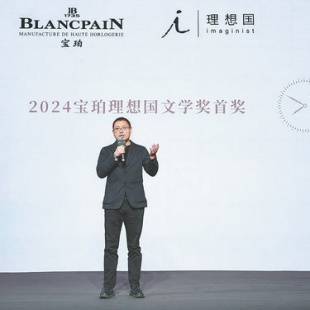Writing the village as universe
Previously shortlisted in 2022, winning novelist's experiment with style finally clinches him the coveted prize, Yang Yang reports.


Wei Sixiao has won the 2024 Blancpain-Imaginist Literary Prize for his novel Tu Guang Cun Mu (Vast land, Small Tree), beating other four shortlisted writers.
Cofounded in 2018 by Swiss luxury watch brand Blancpain and Chinese publisher Imaginist, the annual prize was established to shed light on Chinese writers under 45. The winner receives a cash prize of 300,000 yuan ($42,022), and a Blancpain watch.

The theme of this year's award was "Where is the originality in literature?" According to Leung Man-tao, chief consultant of Imaginist, with the theme, the award chose to inspire people to explore the experiences and creativity that define us as individuals, especially in the context of being surrounded by the cocoon of information, big data, and artificial intelligence.
The evaluation committee, which is composed each year of different writers, literary critics, and a celebrity reader from another field, consisted of poet and literary critic Zhang Dinghao, actor-director Joan Chen, writer Shuang Xuetao, who won the award in 2020, Xu Zidong, former director of Department of Chinese at Lingnan University, and writer Luo Yijun.
Representing the jury, Xu delivered the award speech for the 38-year-old's winning entry. "Focusing on a village, rather than a single character or event, the book makes use of meticulous realism to carry on the tradition of Sheng Si Chang (The Field of Life and Death, by Xiao Hong).
"It deepens and develops the mainstream of Chinese rural literature in terms of space. In terms of time, it not only narrates the lives of farmers over the past few decades, as seen in Huo Zhe (To Live, by Yu Hua) and Pingfan De Shijie (Ordinary World, by Lu Yao), but also keeps pace with the times by depicting new rural scenes: tractors harvesting corn, farmers using social media, township elections and nursing homes.
"Amid the changes to the countryside, it reflects on unchanging aspects, namely the network of interpersonal relationships based on kinship and family ties as described in Fei Xiaotong's Xiangtu Zhongguo (From the Soil: The Foundations of Chinese Society)."
However, at the prize-giving event on Oct 22 in Beijing, Zhang Dinghao raised the issue of whether Wei's work was "repetitive", suggesting that the structural innovation of the novel was designed to mask the repetition of content. He also raised the question of whether the writer was stuck in a habitual style, saying this was "a matter that Wei might need to reflect on".
In response, Wei acknowledged that his limitation was the tendency to repeat themes.
"Some characters may recur, but it's inevitable. After living in the countryside for over 30 years, I've witnessed the gradual development of many characters each year. So, I want to write coherently," he says, adding that he tries to present fresh and overlooked elements with each new novel he writes.





































